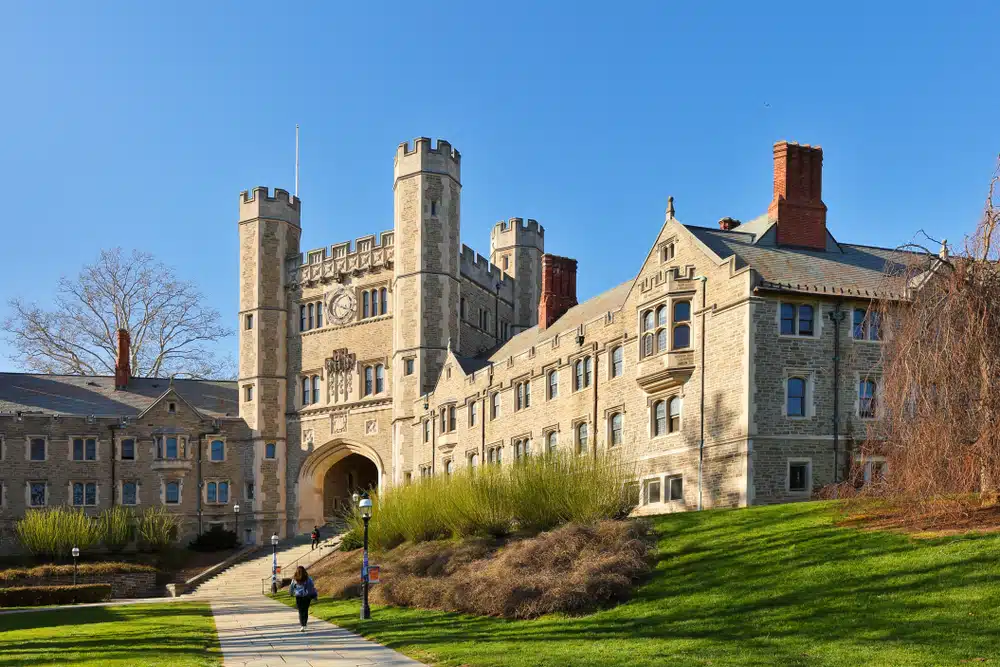Understanding Princeton’s Graduation Requirements
Understanding Princeton’s graduation requirements is a quintessential step toward meeting your academic goals. The unique curriculum, balanced with rigorous major-specific requirements and a broad liberal arts education, is meant to equip students with well-rounded knowledge and critical thinking skills necessary for future success.
The Basics of Princeton’s Graduation Requirements
At its core, Princeton University’s graduation requirements reflect a balance between depth of study and breadth. While requirements may vary by degree and department, there are some commonalities that span the institution.
This balance is reflected in the two main components of the requirements: general education and major-specific coursework. In addition, incorporating independent work through a thesis or similar project is another pivotal part of completing the graduation process.
The Role of General Education in Graduation
Princeton places great emphasis on a well-rounded education. Consequently, the General Education requirements have been structured to ensure that students gain exposure to a myriad of fields, helping them build a robust intellectual foundation.
Courses in areas such as writing, foreign languages, the arts, the humanities, social sciences, natural sciences, and quantitative reasoning, among others, fall within the scope of the General Education requirement. Students are thus given the opportunity to not only focus on their chosen field of study but also broaden their horizons, learning about the cultural, scientific, and historical context of our world.
For example, in the writing component of the General Education requirement, students are encouraged to develop their communication skills through various writing assignments. They may explore different genres, such as persuasive essays, research papers, or creative writing pieces, allowing them to express their ideas effectively.
In the foreign languages component, students have the opportunity to learn a new language or deepen their understanding of a language they already know. This not only enhances their linguistic abilities but also exposes them to different cultures and perspectives.
Furthermore, the arts component introduces students to various artistic forms, such as visual arts, music, theater, and dance. They can explore their creativity, appreciate different artistic expressions, and understand the role of art in society.
By engaging with these diverse fields, students develop critical thinking skills, cultural competence, and a broad understanding of the world, which are essential for success in their academic and professional lives.
Major-Specific Requirements
Once students declare a major, they must fulfill particular requirements associated with that field of study. This involves completing various courses and assignments that offer in-depth exploration and understanding of the discipline.
Requirements vary across majors and are designed to give students extensive knowledge of the field, preparing them for postgraduate studies or professional experiences. By immersing themselves centrally in their chosen field, students are expected to gain mastery of the scholastic material and related skill sets.
For example, in the field of computer science, students may be required to take courses in algorithms, data structures, programming languages, and computer systems. These courses provide a solid foundation in the fundamental concepts and techniques of computer science, equipping students with the necessary skills to solve complex problems and develop innovative solutions.
In the field of psychology, students may be required to take courses in cognitive psychology, social psychology, developmental psychology, and neuroscience. These courses delve into the intricacies of human behavior, cognition, and brain function, enabling students to understand the complexities of the mind and behavior.
By completing major-specific requirements, students gain expertise in their chosen field, allowing them to pursue advanced studies or enter the workforce with a strong foundation in their area of interest.
The Importance of Thesis and Independent Work
Unique to Princeton’s graduation requirements is the incorporation of independent work. This takes the form of a senior thesis required for degree completion.
Undertaking a thesis or similar independent work allows students to explore topics of their interest in-depth and demonstrate their capabilities. It serves as a testament to the skills and knowledge they’ve accrued during their time at Princeton, preparing them for future research or professional engagement in their field.
The senior thesis is a significant undertaking that requires students to conduct original research, analyze data, and present their findings in a comprehensive written document. It provides an opportunity for students to contribute to their field of study, pushing the boundaries of knowledge and making meaningful contributions to their academic discipline.
For example, a student majoring in biology may choose to conduct research on the effects of climate change on marine ecosystems. They would collect data, analyze it using statistical methods, and draw conclusions about the impact of rising temperatures on marine biodiversity. The thesis would document their research process, findings, and implications, showcasing their ability to apply scientific principles and contribute to the field of biology.
Through the process of completing a thesis, students develop critical thinking, research, and communication skills. They learn to formulate research questions, design experiments, analyze data, and present their findings to a scholarly audience. These skills are invaluable for future academic pursuits or professional careers that require independent research and analysis.
Overall, Princeton’s graduation requirements provide students with a comprehensive education that combines breadth of knowledge through general education and depth of expertise through major-specific coursework. The inclusion of independent work through a senior thesis further enhances students’ intellectual growth, preparing them for success in their chosen fields.
Navigating the Academic Calendar
Understanding and following the academic calendar is crucial in achieving your graduation requirements. It incorporates a variety of dates and deadlines that dictate the pace of your academic journey.
When you first enter college, the academic calendar may seem like a maze of dates and deadlines. However, it is essential to familiarize yourself with these important milestones to ensure a smooth and successful academic experience.
One of the most critical aspects of the academic calendar is understanding deadlines and key dates. These include course registration, independent work submissions, exams, and other academic activities. Missing these deadlines can have serious consequences, such as delays in graduation or even the need to retake courses.
To help students navigate these important dates, universities provide a detailed academic calendar. This calendar outlines all the significant milestones throughout the academic year, allowing students to plan their schedules accordingly. Additionally, online resources and academic advisors are available to provide guidance and support, ensuring that students stay on track and meet all necessary deadlines.
Understanding Deadlines and Key Dates
Deadlines and key dates for course registration, independent work submissions, exams, and other academic activities are important to know and adhere to. Missing deadlines can lead to serious consequences, including delays in graduation.
For example, course registration deadlines are crucial as they determine the availability of classes and allow students to secure their desired schedule. Missing this deadline may result in limited course options or being placed on a waitlist for a particular class.
Similarly, independent work submission deadlines are essential for students working on research projects or senior theses. These deadlines ensure that students have enough time to complete their work and receive feedback from their advisors.
Exams are another critical aspect of the academic calendar. Knowing the dates and times of exams allows students to plan their study schedules effectively and avoid last-minute cramming. It also helps students allocate their time and energy appropriately across all their courses.
Navigating these important dates can seem overwhelming, but the University provides a detailed academic calendar, online resources, and academic advisors to keep you on track. Take advantage of these resources to ensure that you never miss an important deadline.
Planning Your Course Load
Planning one’s course load strategically is vital for progressing toward graduation. Balancing your courses across semesters can maximize your learning experience while maintaining academic sanity.
When planning your course load, it is essential to consider a variety of factors. First, you should review your degree requirements and identify the courses you need to take each semester. This will help ensure that you are on track to meet all your graduation requirements.
Choosing a balanced mix of major-specific, elective, and general education courses each term can prevent overwhelming course loads in your final years, aid in exploring a wide range of disciplines, and facilitate timely completion of graduation requirements.
It is also important to consider your personal strengths and weaknesses when selecting courses. If you struggle with a particular subject, it may be beneficial to spread out those courses over multiple semesters to avoid feeling overwhelmed.
Additionally, take into account any extracurricular activities or part-time jobs that may impact your schedule. Balancing your academic commitments with your other responsibilities is crucial for maintaining a healthy work-life balance.
By planning your course load strategically, you can ensure that you make the most of your college experience while staying on track to graduate on time.
The Role of Academic Advising
Academic advisors play an essential role in guiding a student’s journey to graduation. They can help negotiate the labyrinth of course requirements, deadlines, and other academic hurdles.
But what exactly does academic advising entail? It goes beyond simply providing information about course selection and registration. Academic advisors are there to support and empower students throughout their academic journey, helping them make informed decisions and navigate the complexities of higher education.
One of the key ways in which advisors support students is by providing guidance in interpreting the requirements for their major and the broader graduation requirements of the University. They have a deep understanding of the curriculum and can help students map out their academic path, ensuring that they are taking the necessary courses and meeting important deadlines.
Moreover, advisors can offer valuable insights into the various academic opportunities available to students. They can help students explore different majors, minors, and concentrations, as well as provide information about study abroad programs, internships, and research opportunities. By working closely with advisors, students can make well-informed decisions that align with their interests, goals, and aspirations.
How Advisors Support Your Graduation Path
Academic advisors play a crucial role in supporting students on their graduation path. They are not only there to provide guidance on course selection and registration but also to offer mentorship and support throughout the entire academic journey.
When students first enter college, they may feel overwhelmed by the multitude of options and choices available to them. Academic advisors can help alleviate this stress by providing clarity and direction. They can help students understand the requirements for their major, the prerequisites for certain courses, and the sequence in which courses should be taken. This guidance ensures that students stay on track and make progress towards their degree.
Furthermore, advisors can assist students in identifying their strengths, interests, and goals. They can help students explore different academic and career paths, providing resources and information that can help them make informed decisions. By working closely with advisors, students can develop a clear sense of purpose and direction, which can greatly enhance their academic experience.
Making the Most of Advising Sessions
To extract the most value from your advising sessions, it is important to come well-prepared and engaged. This means taking the time to review your academic progress, identifying any questions or concerns you may have, and setting goals for the future.
During advising sessions, it is crucial to maintain an open dialogue with your advisor. Be proactive in discussing any potential issues or challenges you may be facing. Whether it’s struggling with a particular course, feeling overwhelmed by the workload, or considering a change in major, your advisor is there to listen, provide guidance, and offer support.
Remember, your advisor is not just there to provide answers but also to empower you to make informed decisions. Take advantage of their expertise and ask questions. Seek their advice on course selection, internships, research opportunities, and other academic endeavors. By actively engaging in these conversations, you can gain valuable insights and make the most of your academic journey.
In conclusion, academic advising is a vital component of a student’s success in college. Advisors provide guidance, support, and mentorship, helping students navigate the complexities of higher education. By working closely with advisors and making the most of advising sessions, students can make informed decisions, stay on track toward graduation, and maximize their academic experience.
Frequently Asked Questions about Graduation Requirements
A thorough understanding of Princeton’s graduation requirements can help avoid common misconceptions and overcome potential challenges. Here, we highlight some general queries and their clarifications to help you stay on track.
Common Misconceptions about Graduation Requirements
One common misconception is that all graduation requirements are uniform throughout the university. This is not the case. Some requirements, like major-specific courses, vary depending on your field of study. It is important to consult with your advisor and understand the requirements unique to your chosen discipline.
Overcoming Challenges in Meeting Graduation Requirements
Meeting Princeton’s graduation requirements can be overwhelming, but they are manageable with proper planning and support. If you face difficulties, do not hesitate to seek advice from your advisor, faculty, or fellow students. Princeton offers various resources to make the journey smoother and more manageable.
Preparing for Life After Graduation
A Princeton degree sets the stage for an array of paths post-graduation, from continuing in academia to launching a professional career.
The Value of a Princeton Degree
A Princeton degree is recognized globally for its high academic prestige and value. Graduates from Princeton have excelled across all fields, demonstrating the wide-ranging applications of a Princeton education.
Transitioning from Student to Alumnus
Beyond the extensive academic training, a Princeton education also provides lifelong membership in a vibrant community of alumni. With a strong tradition of mentorship, networking, and support, the transition from student to alumnus is one of exciting new possibilities and ongoing connections.
Conclusion
In conclusion, understanding and managing Princeton’s graduation requirements may seem challenging at first glance, but it is a journey well worth undertaking. With careful planning, dedicated support from academic advisors and peers, and your unwavering commitment to your educational goals, you will find that navigating these requirements is not only manageable but also immensely rewarding.
As you progress through your academic journey, you’ll meet the requirements and discover your passions, explore new perspectives, and develop the resilience and adaptability needed for success in a rapidly changing world. Moreover, the liberal arts education offered at Princeton will equip you with a well-rounded foundation that goes beyond the classroom and prepares you for a lifetime of intellectual growth and meaningful contributions to society.
So, while the path to graduation may have its challenges, it is a path that leads to a world of opportunities. Embrace the academic adventure, seek guidance when needed, and remember that every requirement you fulfill is a step toward realizing your full potential and making a positive impact on the world. Princeton is not just a university; it is a transformative journey that will shape your future in ways you can’t yet imagine.
Having all the necessary information is important before choosing any course of action. AdmissionSight is always here to assist you with any questions or concerns. We have more than ten years of expertise assisting students in successfully navigating the challenging admissions process.
Consult with AdmissionSight and find out what we can do to help you get into the school of your choice by ensuring that you are sufficiently aware and well-prepared for the application process.









































